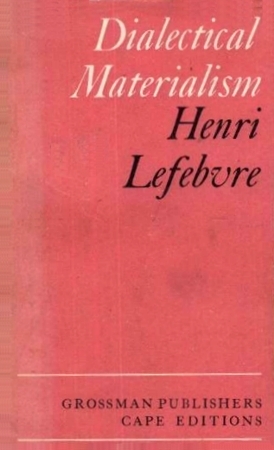Despite being an incredibly concise (and exhilarating) read, Lefebvre's "Dialectical Materialism" left me not just with many new perspectives on it's central topic, but first and foremost with a great sadness, that the reception of Lefebvre's work seems to this day tragically limited.
"Dialectical Materialism" manages to tackle the topic of how a Marxist theory of man, nature, history, politics, culture and more should be conceptualised in three major ways:
1. Retrospectively the book can be seen as an incredibly valuable intervention at a time when Marxism was historically in a great ubheavel. Critically pulling from at the time freshly rediscovered, until then unpublished writings, like Marx's 1844 Manuscripts, Lefevbre stages a radical turn away from the dogmatic stalinist reading of the "DiaMat". Crucially he does so in a way that incorporates both humanist Marxist commitments as well as - at the time - just developing insights from existential philosophy.
2. In doing so Lefebvre not only lays the groundworks for the commitments he would keep with him throughout all his following works (e.g. the attempt at finding a synthesis between Nietzschean and Marxist theory and method that would later be at the heart of French post structuralist thought), but he manages to read Marx in a way that already straddles the line and finds unexpected moments of synthesis between usually and at times fiercely opposed existential/humanist, materialist and (an early critical engagement with) structuralist registers; making good on the dialectical promise of sublating such oppositios.
In doing so he also seems prefigure a lot of the twists and turns Marxist thought (and he himself) would later see in the pull between (post-)structuralist, existentialist, phenomenological and new materialist readings; especially thinkers like Sartre, Deleuze, Althusser, Trần-đức-Thảo and the Merleau-Ponty of the PoP and the Adventures came to mind. In that vein, even in 1938 it already seemed fitting that Jean Baudrillard would later be a student of Lefebvre.
3. Lastly Lefebvre plainly and simply manages to elucidate the development of Marx's relation to Hegel's thought (here Lefebvre manages a convincing case against the supposed epistemic break between early and late Marx), Marx's materialist Transcendence of classical dichotomous problems like the materialism/idealism- or the subject-/object-divide and it's ontological, epistemological, political and metaphysical upshots incredibly well.

